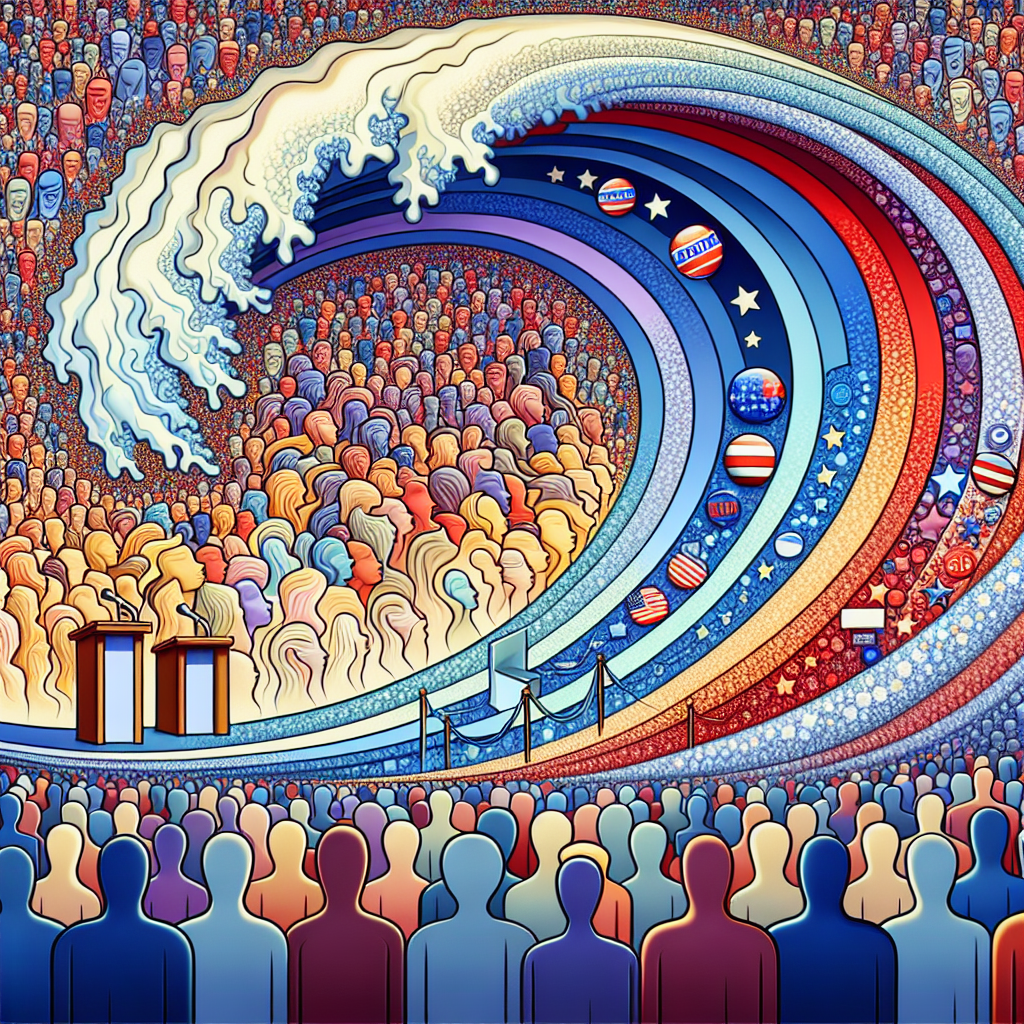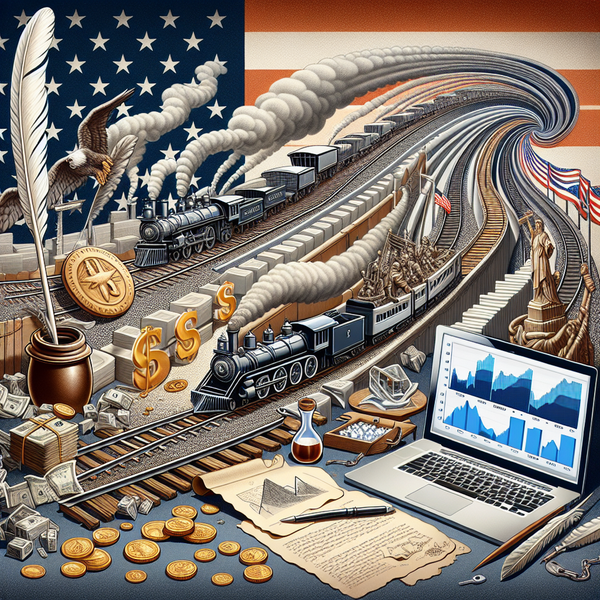The Rise of Populism in American Politics

The Unstoppable Surge of Populism in American Politics
From its humble beginnings to its profound impact today, populism has undeniably become an integral part of American politics. This dynamic, often misunderstood phenomenon, has captivated the hearts and minds of many, carving a niche for itself in the political landscape of the nation. The rise of populism signifies a seismic shift in the way politics is conducted, as it often challenges the status quo, embracing the concerns and aspirations of the 'common man'. This wave of change, driven by a new breed of political leaders and an increasingly engaged populace, has transformed the American political discourse, leaving a lasting imprint on the fabric of our society. This piece aims to delve into the rise of populism, exploring its origins, its influence, and its potential future in American politics.
Introduction to Populism in American Politics
Populism in American politics has a rich history, rooted in the social, economic, and political contexts of different eras. It is a political philosophy promoting the rights and power of the people in their struggle against the privileged elite. The rise of populism reflects a deep dissatisfaction with the status quo and a demand for change on the part of the people.
Historical Background of Populism
The Populist movement first emerged in America in the late 19th century. The Populist Party, also known as the People's Party, was formed in 1891 by farmers, laborers, and miners against the economic and political domination of corporations and banks. They proposed various reforms, including the direct election of Senators, a graduated income tax, and an expanded money supply to stimulate economic growth.
The Rise of Populism in American Politics
The 21st-century resurgence of populism in American politics has been largely driven by growing economic inequality, demographic changes, cultural shifts, and perceived government dysfunction. These factors have caused a significant number of Americans to feel ignored or marginalized by the political establishment, leading to a rise in populist sentiments.
Practical Examples of Populism
A prime example of modern populism in American politics is the 2016 election of Donald Trump. His campaign capitalized on populist rhetoric, positioning him as an outsider fighting against a corrupt and disconnected political elite. He tapped into the fears and frustrations of voters who felt left behind by globalization and cultural change, promising to "drain the swamp" and put "America First." Bernie Sanders' presidential campaigns also demonstrate a form of left-wing populism. Sanders' message focused on income inequality, corporate greed, and the need for reforms like universal healthcare and free college tuition. His campaigns resonated with many voters who felt marginalized by the economic system and disillusioned with the political establishment.
Insights into the Rise of Populism
The rise of populism in American politics can be viewed as a response to the perceived failure of the political establishment to address the needs and concerns of ordinary citizens. Populist leaders often present themselves as the voice of the "forgotten" men and women, promising to shake up the system and bring about change. However, populism can also be divisive, often drawing sharp lines between "the people" and "the elite," or between different groups within society. While it can bring attention to important issues and drive significant change, it can also lead to increased polarization and conflict. In conclusion, understanding the rise of populism in American politics requires a nuanced understanding of the social, economic, and political factors driving this trend. As the political landscape continues to evolve, the influence and implications of populism will undoubtedly continue to be a significant factor in American political discourse.
Use Case 1: Educational Content on Political Studies Websites
As an SEO content writer, one of the applications of 'The Rise of Populism in American Politics' could be for educational content on political studies websites. These websites often need well-researched, high-quality content that not only provides information but also engages and retains the reader's attention. In this use case, the content writer would research and write a detailed article examining the causes, effects, and implications of the rise of populism in American politics. The content could include historical context, case studies of populist leaders, and analysis of populist movements. The writer would use SEO techniques to optimize the content, such as using relevant keywords like 'populism in American politics', 'populist leaders in America', and 'effects of populism', and incorporating them naturally into the text. This would help the website rank higher in search engine results and attract more visitors.
Use Case 2: Content for Political Campaign Strategy Blogs
Another application of 'The Rise of Populism in American Politics' could be for content on blogs that provide political campaign strategies. Such blogs often need content that analyzes current political trends and provides insights into how to leverage these trends for campaign success. In this use case, the content writer would write an article exploring how the rise of populism in American politics has impacted campaign strategies. They could discuss how populist rhetoric can be used to mobilize supporters, or how traditional politicians have adapted their strategies in response to the populist trend. Again, the writer would use SEO techniques to optimize the content, using relevant keywords like 'political campaign strategies', 'populist campaign tactics', and 'American political trends', among others.
Use Case 3: Content for News Media Outlets
News media outlets are always in need of timely, insightful content on current political affairs. 'The Rise of Populism in American Politics' is a topic that could be used for articles analyzing recent political events or predicting future trends. In this scenario, the SEO content writer could draft an article highlighting the role of populism in recent elections, or forecasting how the rise of populism might impact future political dynamics. The writer would use SEO strategies to help the article reach a wider audience, incorporating relevant keywords like 'American politics news', 'populism in American elections', and 'political predictions', to name a few. Title: The Rise of Populism in American Politics Introduction Populism, a political approach that strives to appeal to ordinary people who feel that their concerns are disregarded by established elite groups, has been progressively infiltrating American politics. It is a phenomenon that has been studied, analyzed, and interpreted from different angles across various disciplines. The Populist Revival The last decade has witnessed a significant resurgence of populism in American politics. This resurgence encapsulates a wide range of issues, including economic disparity, immigration, and national identity. Experts attribute the rise of populism to various factors. A study published in the American Political Science Review suggests that the socio-economic shifts, the cultural anxieties of the American populace, and the political polarization have contributed to this resurgence. Economic Inequality and Populism Economic inequality is one of the leading factors behind the rise of populism in American politics. According to a report from the Brookings Institution, the growing wealth divide in America has created a sense of economic injustice among the lower and middle-class citizens. This feeling of economic alienation often leads to a heightened attraction towards populist leaders who promise radical changes to the existing economic structures. The Role of Immigration Another significant factor contributing to the rise of populism is immigration. The Center for American Progress suggests that the perceived threat to national identity and cultural homogeneity from immigrants has fueled populist sentiments. Populist leaders often exploit these fears, promising strict immigration policies to secure the national identity. Political Polarization Lastly, political polarization has played a crucial role in the rise of populism. The Pew Research Center reports that the United States has seen an increasing political divide over the past few years. This stark ideological divide often leads to populist leaders capitalizing on the frustrations of those who feel left behind by the political establishment. The Impact of Populism on American Politics The rise of populism has profound implications for American politics. On the one hand, it has energized a significant portion of the electorate, leading to increased political participation. On the other hand, it has also led to an increase in political conflict and partisan gridlock. Conclusion The rise of populism in American politics is a complex phenomenon influenced by a variety of socio-economic and political factors. As the country grapples with economic inequality, immigration, and political polarization, the allure of populist leaders continues to grow. While populism can serve as a catalyst for political engagement, it also carries the risk of deepening political divisions. As such, understanding and addressing the factors that contribute to its rise is critical for the future of American democracy.
1. What is populism in the context of American politics?
Populism in American politics refers to a political approach where leaders appeal directly to the people, often with the promise of addressing their grievances. They typically position themselves in opposition to the established political elite, claiming to represent the ordinary citizen.
2. When did the rise of populism begin in American politics?
While there have been various waves of populism in American history, the most recent rise is often traced back to the 2008 financial crisis. However, the 2016 presidential election of Donald Trump is seen as a significant manifestation of this trend.
3. What factors have contributed to the rise of populism in American politics?
Several factors have contributed to the rise of populism, including economic inequality, demographic changes, political polarization, and a widespread distrust of institutions and elites. The advent of social media has also played a significant role, enabling populist leaders to communicate directly with their supporters.
4. How does populism impact American politics?
Populism can deeply impact American politics by shifting the political discourse and influencing policy decisions. Populist movements can lead to more extreme political positions, increased polarization, and a breakdown in traditional party politics.
5. Is populism unique to the United States?
No, populism is not unique to the United States. It has been a significant political trend in many countries around the world, particularly in Europe and Latin America.
6. Can populism be both a positive and negative force in politics?
Yes, populism can be both positive and negative. On one hand, it can bring attention to marginalized groups and overlooked issues. On the other hand, it can contribute to political polarization, undermine democratic institutions, and lead to policy decisions based more on popular sentiment than on sound analysis. In conclusion, the rise of populism in American politics is a phenomenon that reverberates across all industries and historical eras. Its implications are far-reaching and deeply entrenched in the socio-economic and political fabric of the nation. Whether one is involved in healthcare, technology, education, or manufacturing, the populist wave often results in policy changes that directly or indirectly influence these sectors. Moreover, the historical context of populism, from its roots in the late 19th century to its modern resurgence, offers meaningful insights into the cyclical nature of political trends and the enduring power of the populace in shaping the national narrative. Understanding this political movement, therefore, is not just about comprehending the political climate of one particular era or industry, but about gaining a broader perspective on the evolution of American democracy itself. Hence, the rise of populism is not a fleeting phenomenon but a pivotal aspect of American politics that continues to shape discourse, policy, and industry trends.



